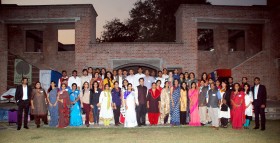 Last week, Tata Trusts and Harvard University South Asia Institute (SAI) ran the first workshop on Rural Livelihoods Creation in the Indian Crafts Sector at the Enterprise Development Institute of India in Gandhinagar, Gujarat, part of the research project with Tata Trusts on social and economic empowerment in India. The workshop brought together 65 leaders from 50 social businesses and non-profits from 15 states in India working towards improving artisan livelihoods and skills. Over the course of three days, participants engaged with guest speakers and were immersed in the signature Harvard Business School case methodology.
Last week, Tata Trusts and Harvard University South Asia Institute (SAI) ran the first workshop on Rural Livelihoods Creation in the Indian Crafts Sector at the Enterprise Development Institute of India in Gandhinagar, Gujarat, part of the research project with Tata Trusts on social and economic empowerment in India. The workshop brought together 65 leaders from 50 social businesses and non-profits from 15 states in India working towards improving artisan livelihoods and skills. Over the course of three days, participants engaged with guest speakers and were immersed in the signature Harvard Business School case methodology.
Dr. Shashank Shah, Project Director, began the workshop by giving an overview of the Tata Trusts project, and the imperative to focus on capacity building in the crafts sector, which is the second largest employing sector after agriculture in rural India. Ashoke Chatterjee, former Director of the National Institute of Design (NID) and Hon. President of the Crafts Council of India gave an inspiring keynote address, sharing his experiences in the sector and the journey he embarked upon with the late Ravi Mathai by establishing the Artisan Alliance of Jawaja in Rajasthan. He emphasized that the crafts sector was a sunrise industry with immense potential of economic and social empowerment in rural India. He also said that the crafts sector was best suited to achieve the Sustainable Development Goals (SDGs) due to the environment-friendly and socially collaborative approach to growth.
The curriculum developed by SAI’s project addresses the entire crafts value chain, and was specifically tailored to the needs of the 50 participating organizations at the workshop. It was prepared through an inductive approach wherein inputs from the participating organizations and the field visits undertaken by the SAI Team were used to draft the curriculum.
Sessions on the first day focused on strengthening production at the grassroots, and included Artisan Outreach, Training and Skills Development by Archana Shah, Founder of Bandhej; Working with Artisan Communities through Natural Disasters by Mihir Bhatt of AIDMI; and Reimagining Products and Design by Shimul Mehta of NID. The session ended with an exhibition of products by the participating organizations in the large quadrangle of the Institute. It was a riot of colors, innovative ideas and rich design, and a display of the ancient Indian heritage still living through the crafts sector.
On the second day, Professor Mukti Khaire, Faculty Chair of the Workshop and Associate Professor at the Harvard Business School, taught the SEWA (Self-Employed Women’s Association) Trade Facilitation Center case study she authored. SEWA aims to organize women workers for full employment. The case study focused on the importance of process innovations and supply chain efficiencies. The protagonist of the case, Reema Nanavaty, Head of SEWA, addressed the participants and provided an overview of the latest growth plans at the organization. This session was followed by a field visit to the SEWA Trade Facilitation Center in Ahmedabad, where the participants interacted with the artisans from SEWA and heard their personal stories of skills development and social and economic empowerment.
In the afternoon, through a session on Fundraising, Policy, and Certifications (speakers included Shishir Dash, Tata Trusts; Apurva Bubna, Aavishkaar; Madhura Dutta, AIACA – All India Artisans and Craftsworkers Welfare Association; and Aditya Ramji, CEEW – Council on Energy, Environment and Water), participants were able to understand how they could best secure the type of support they need to scale their operations in terms of private and government funding. They also got exposed to the various certifications that are available to ensure high quality standards in the crafts sector.
The third day of the workshop focused on addressing the market component of the value chain. Interactive sessions led by Aditi Aman Shah, Founder, The Rare Earth; Meeta Sandeep, Senior Merchandiser, Either/Or; Ritesh Mehta, Head of Economic Initiatives – India and South Asia, Facebook; and Nitin Pamnani, Co-founder, iTokri, addressed pricing, merchandizing, social media platforms, and e-tailing. Professor Mukti Khaire, HBS, concluded the workshop with the FabIndia Case Study she authored, providing the participants with a framework to think through growth and scale.
Through the three days action-packed days, participants were able to embark upon a reflective journey that allowed them to take a step back from their day-to-day operations and think about their work from diverse perspectives. A key outcome of the workshop was the beginning of collaboration among the peer groups through an alliance model.
Read more about the Livelihood Creation project with Tata Trusts
